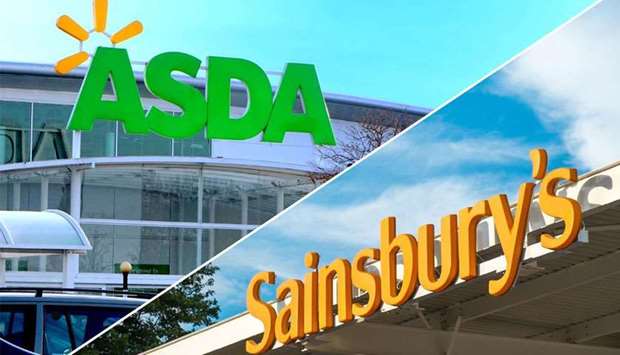Regulator said combination would lead to increased prices; Sainsbury's, Walmart and Asda terminate transaction; Sainsbury's CEO says confident in strategy despite prohibition; Walmart will ensure Asda has resources to be strong UK retailer
Britain's competition regulator on Thursday blocked Sainsbury's proposed £7.3bn ($9.4bn) takeover of Walmart owned Asda — a huge blow to the supermarket groups who wanted to combine to overtake market leader Tesco.
The Competition and Markets Authority (CMA) ruling is also a major setback for Sainsbury's chief executive Mike Coupe, the architect of the deal and the group's boss since 2014.
For Walmart, the deal was a way to exit Britain, one of the weakest performers in its global portfolio.
Sainsbury's Coupe made unwanted headlines when he was caught on camera singing: "We're in the money" shortly after the deal was announced last April.
Analysts said questions will be raised over his future after it failed to win approval.
The deal would have resulted in a substantial lessening of competition at both a national and local level, with prices rising in stores, online and at petrol stations, the CMA said.
Coupe took issue with the CMA's analysis.
"The specific reason for wanting to merge was to lower prices for customers," he said.
"The CMA's conclusion that we would increase prices post-merger ignores the dynamic and highly competitive nature of the UK grocery market.
The CMA is today effectively taking 1bn pounds out of customers' pockets."
Sainsbury's, Walmart and Asda said they had mutually agreed to terminate the transaction, opting not to challenge the CMA's ruling through the courts.
Walmart International CEO Judith McKenna said the parent will now focus on positioning Asda as "a strong UK retailer."
"Walmart will ensure Asda has the resources it needs to achieve that," she said.
Analysts and investors in the US said the deal's failure is a setback for Walmart, slowing its drive towards profitability in overseas operations.
The US retailer has been focused on turning around its international business by targeting higher growth markets such as China and India and exiting or tying up with local players elsewhere.
It has sold a majority stake in its Brazilian business and acquired a majority interest in Indian e-commerce company Flipkart in its biggest-ever deal last year.
"It is a sticking point but not a disaster," said Laura Kennedy, vice president, retail sales and shopper practice at Kantar Consulting."They were going to keep a share in Asda and were not completely cutting it loose."
A source with direct knowledge of the matter said Walmart is in no rush to make a decision on the fate of the business, pointing to Asda's recently improved performance.
Asda has reported seven consecutive quarters of growth, helped by improvements in its e-commerce and lower prices.
It also leapfrogged Sainsbury's last month to become the second-biggest supermarket operator behind Tesco in the UK, according to data from Kantar.
Shares in Sainsbury's were down 4.6% at 1458 GMT, extending their losses over the last three months to 22%. Walmart was 0.36% lower at $103.2 per share.
After delivering a damning provisional report in February, the CMA's final report was equally stern, finding that UK consumers would be worse off if Sainsbury's and Asda combined.
"We have concluded that there is no effective way of addressing our concerns, other than to block the merger," said Stuart McIntosh, chair of the CMA inquiry group.
In the past year, Sainsbury's share of the UK grocery market has dropped from 15.8% to 15.3%, while Asda's has fallen from 15.6% to 15.3%, according to Kantar.
All of the UK's big four grocers have lost share to German discounters Aldi and Lidl, which now have a combined 13.6% share.
Tesco has 27.4%. Sainsbury's and Asda argued that their share of the total market for food was smaller than the data indicated because of the emergence of new players like delivery services, but the regulator was not persuaded.
The implications of the deal failing are likely to be significant.
Some analysts believe Sainsbury's will have to undergo a major shake-up that could see new chairman Martin Scicluna part company with Coupe.
Analysts said the risk of a reinvigorated Tesco continuing to recover customers lost to Sainsbury's needed addressing urgently.
The group publishes full-year results on Wednesday, an opportunity to show investors it can arrest the decline.
Analysts said a margin reset may be necessary.
With one potential exit route from Britain for Walmart blocked, analysts said it might instead consider a stock market listing of Asda or try to sell it to private equity.
Walmart acquired Asda in 1999 and the acquisition has since generated cash and paid more than £3bn ($3.87bn) in dividends to its US parent.
The Sunday Times reported in February that private equity group KKR was mulling an offer for Asda.
But both of these avenues are problematic.
"The problem with the idea of private equity is that the only way PE makes money is to have its own exit and there isn’t one because you can’t break-up Asda now," one senior UK supermarket director told Reuters.
"The problem with an IPO is — what growth prospects are you selling? The story to investors is not a very good one."
Some analysts said the deal's prohibition has in effect put a block on any other major UK supermarket deals going forward.
But the CMA's McIntosh said this wasn't the case."Any future mergers would be considered on the merits of those individual cases," he told Sky News.

